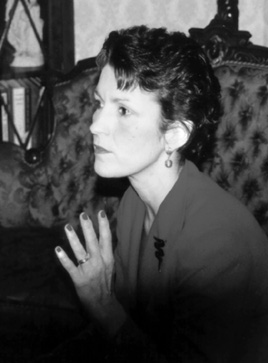 NBT Interview:
NBT Interview: NBT Interview:
NBT Interview:
Frances Glendening
with Sandra Martin
Maryland's First Lady
Is One Busy Lady
Maryland's First Lady, Frances Hughes Glendening, is cut from a new mold. Who knows? Maybe this daughter of a high-ranking state lawmaker and wife of a governor cut the new pattern.
Early mornings, nights and weekends, she manages a schedule of public appearances, advocacy and outreach that's nearly as full as husband, the governor's. That's before and after she commutes to Washington, D.C., for her full-time job in the federal government.
How does she prioritize a life so full? That's the question New Bay Times posed in a recent morning interview in the Victorian Library of Government House. Dressed for a full day as First Lady in her trademark cardinal red with matching nails, Mrs. Glendening said family comes first.
While climbing with her husband's rising political star and juggling a 40-hour-plus work week, Frances Glendening, 47, has been a cookie-baking mother and a loving, care-giving daughter - not to mention wife, sister, aunt and niece.
For Mother's Day, First Lady Glendening speaks to us candidly, helping us praise our mothers and brush up on the only job that lasts a lifetime. She shares with us some of her secrets while showing us what's new in Government House.
Q Mrs. Glendening, we're especially glad to talk with you at Mother's Day since, as First Lady, you play a mother's role for all of Maryland.
Tell me, in this day when so many mothers are struggling with so many roles, how do you combine your many roles: mother, wife, first lady, apparently tireless volunteer - all while holding down a full-time job?
A Some days are better than others. It's a little easier to accommodate all the roles some days than others because I work full time in D.C. and then, of course, I have my responsibility as a first lady and my most important responsibility as the mother of a young man of 18.
Q So your role as mother has been your first priority?
A You don't get another chance at that.
When Raymond was still in high school, I would never combine two nights in a row out because I wanted to be at home with him. I felt it was important for me to be there, to have the two of us eat dinner even if his father couldn't be there. When he came home from school, I asked him to call me and let me know how his day was, how much homework he had and where he was going to be since he usually wanted to go out and play basketball with friends so he could get off the tensions of the day.
But he has gone off to college, so that responsibility is not quite so much every day as it was before. We talk to him on the telephone, of course, but now I'm freed up to do more things in the evening - which I do, almost every evening. Which is why I have permanent dark circles; my circles have circles.
Some people have remarked that I'm out more now, and it's no secret why that's happened: because my son, who is my first priority, my special treasure in life, isn't at home.
Q Let's broaden our scope a bit. How do you translate your own experience to the responsibilities that come to you as First Lady, where, for example, you are special chair for the Caring for Every Child's Mental Health Campaign?
A One of the things I say to parents is, when your child has a fever or a sprained ankle, you know something's wrong. But when your child may be having emotional problems and you're not sure how things are going with them, you've got to be there. And you've got to be there, not reading the newspaper but focusing in on them, which is what I've tried to do.
I have found the most significant talks were not the family discussions when Parris and I would say, 'We've got to talk with you.' The big family pow-wows that were set up with an assigned agenda were not the best and most intimate discussions that I had with my son.
We had the most revealing talks when we were driving some place, sitting down and eating dinner together, occasionally seeing a movie together or renting a movie. Those were the kinds of things that would stimulate discussions about how he was feeling. But you have to be there.
You have to be there to know when something doesn't seem right, whether it's a couple of days or a week when your child is in kind of a funk, as the kids would say, or if there's something else going on.
Q Give us some tips on how you juggle all those responsibilities.
A I'm a very organized person. I was naturally, and I have to be.
For example, when Raymond was playing baseball, I would not schedule my spring speaking until I found out when his baseball games were.
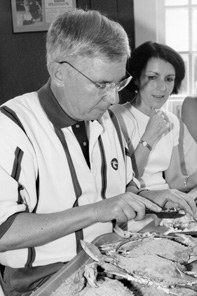 If people didn't
understand, I said to my assistant, 'all you have to say, very nicely, is
that she doesn't have her son's baseball schedule yet.' The thing is, if
somebody's really angry with me because of that, they probably don't want
me to come to speak anyway because they wouldn't want to hear what I have
to say.
If people didn't
understand, I said to my assistant, 'all you have to say, very nicely, is
that she doesn't have her son's baseball schedule yet.' The thing is, if
somebody's really angry with me because of that, they probably don't want
me to come to speak anyway because they wouldn't want to hear what I have
to say.
We keep a family calendar. My scheduler and the governor's scheduler all work together. [Starting with Raymond's college calendar] we map out certain things to make sure time's available, and that's sacred.
Every year, except election year, we take a two-week family vacation where we rotate who gets to pick. Normally we plan way far in advance when our family vacation is. Then Parris and Raymond will have their guy fishing trips that they go on. And Parris and I have always had certain weekends, for example around our anniversary or my birthday - which is just two days before Valentine's Day - that are just for the two of us.
Birthdays and holidays are mapped off on the calendar.
Thanksgiving we usually go to family. Those are sacred times we map out far in advance.
At left, Native Marylander Frances Glendening oversees as adopted Marylander Gov. Parris Glendening tackles a Chesapeake Bay blue crab last Labor day.
Q When did you go back to work after you son's birth?
A I worked at home for the first year and a half. I reviewed and edited procedures, proceedings of meetings, studies from the Committee on Intergovernmental Relations, things that were messengered to me.
Q You have a degree in English, as well as government, don't you, preparing you to do that kind of work?
A My bachelor's degree is in English and government and my master's is in government relations.
I like to write. In Prince George's County, I did a lot of writing and editing on such publications as the employee handbook and newspaper. I took a few courses at the community college just to get the style. That's one of the things I tell young people: one of the things that has gotten me a lot of jobs is that I can write well. I've always worked at it and I still do, quite a bit, because I enjoy it. That's one of the things I want to do in my next career.
Q You have a law degree, as well, from Catholic University. Have you ever practiced as a lawyer?
A I really wanted a law degree to help me in my work as a public administrator.
Q Tell us a bit about your work in Washington.
A I work at the Federal Election
Commission for one of the six commissioners as a legal and policy advisor.
Th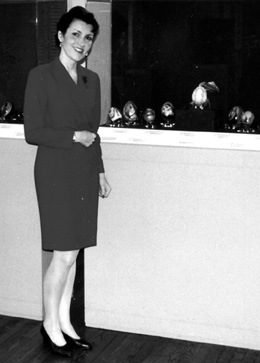 e commission
makes decisions on campaign finance issues; it's really restricted to the
money part as opposed to the conduct of elections. The Federal Election
Commission regulates how money is raised and spent in federal elections.
As you can imagine, it's somewhat hectic right now.
e commission
makes decisions on campaign finance issues; it's really restricted to the
money part as opposed to the conduct of elections. The Federal Election
Commission regulates how money is raised and spent in federal elections.
As you can imagine, it's somewhat hectic right now.
It's very important work, because I believe we're the overseers of our system, but it's not very popular work. Nobody's ever happy with what we're doing. We'll have hearings on Capitol Hill and Congress oversees our funding. It's interesting to hear, within the same committee, on the one hand you're like the Gestapo and you're nitpickers, you're overdoing it. And on the other hand hearing, you're soft on crime. Literally in the same hearing. That's a little frustrating sometimes.
I guess if anybody were ever really happy with you, you wouldn't be doing a good job.
Frances Glendening shows off the Russian Embassy's collection of Imperial Faberge porcelain Easter eggs on display at Government House through May, at left. photo by Nathaniel Knoll.
Q You seem to have an abiding love of political process
A I believe in public service. I come by that from my father, who was a lawyer, a state legislator and a judge on the Maryland tax court. I know it was at great personal and financial sacrifice, personal sacrifice for my family to have my father gone to the Legislature for 90 days with my mother up in Western Maryland with five children.
He and my mom taught me it's very important who serves the public. Whether it's in elected or appointed positions, we need to have the very best people we can. Parris and I both have a strong commitment to public service.
Q So your parents were strong influences in shaping the kind of woman you became?
A Without question. My parents, Patricia and George Raymond Hughes Jr. both were just unbelievably caring people, and they were dedicated to us and to the community. I got so many great things from both of them, and I feel very fortunate.
Even the decisions to run for certain political offices were family decisions, as when Parris and Raymond and I sit down and talk. Because it is a sacrifice for the family, there will be less time. It's a sacrifice you want to make, but it's still something that should be talked about in the family, what it means and why it's important to do it. That's exactly what I grew up with.
Q As we write about women of achievement, we like to learn about the forces that set you on that path. Many women have told New Bay Times that family time in their girlhoods shaped their sense of ability in the world. Was that true in your family?
A I was around United States
senators and governors from the time I was very young. When I was growing
up in my family, we would travel throughout Maryland. Our typical family
vacation was to come to the Eastern Shore for two weeks. We'd always stop
in Annapolis for a couple of 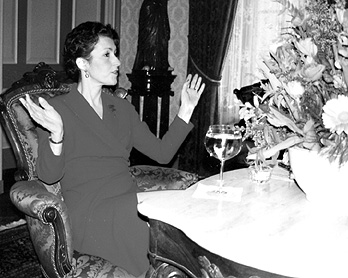 days and see the governor. Then before we hit Ocean
City, we'd stop and see Lloyd Lewis "Hotdog" Simpkins, one of
my father's closest friends in law school. Then they started in the legislature
together and he was Secretary of State under Millard Tawes while my dad
was minority leader. Sometimes we'd take different families with us and
have two or three houses.
days and see the governor. Then before we hit Ocean
City, we'd stop and see Lloyd Lewis "Hotdog" Simpkins, one of
my father's closest friends in law school. Then they started in the legislature
together and he was Secretary of State under Millard Tawes while my dad
was minority leader. Sometimes we'd take different families with us and
have two or three houses.
My dad would talk with me, not only about his work as a lawyer but also his work in the Legislature. As the eldest, I was the one who went with him some times, and I saw how important his work was.
Mrs. Glendening in the Victorian Library at Government House. photo by Nathaniel Knoll.
Q And your mother's influence?
A My mother was one of the most unbelievable human beings I have ever met. I was the oldest of five children, and my mother went to everything. It's still an enigma to me how she did it. We were all very active, and she'd be there for us. My dad was there a lot of the time, too. We knew we were important.
She loved us each for our gifts and our talents. There was no pre-set mold. Holidays were really a big deal, and birthdays. On your birthday, you got everything you wanted all day long to eat. I loved strawberry pie. I was born in February, on Lincoln's birthday. I don't know how she found strawberries for strawberry pie, but she really made an effort.
My mom was also the best hugger in the world. My mom taught me my hugging skills, and my dad taught me my handshake. 'Don't have one of those [she speaks in a loud, authoritative voice and mimes a limp, fishy handshake] handshakes. Have a strong handshake.'
Q How did your relationship with your mother evolve over the years?
A Because we both got up early, we'd talk on the phone often early in the morning. She'd say, 'I thought of you this morning. I really missed you this morning because I knew you'd be up with me.'
There'd been an ice storm over the night, and I used to love to get up just as the sun was coming up and see the glistening in the trees. It's just extraordinarily beautiful. It's just breathtaking. You know I'm a big supporter of the arts, but Mother Nature is perhaps the greatest artist.
My mother and I had a great relationship. I think as the eldest I was really there with her, and I was in Maryland [while other children in the family were not]. She stayed with me a lot during her illness and treatment.
Q So you've shared another role that comes to so many of us in midlife, caring for a parent?
A At the end, it was a six-chemical protocol, and she really needed me to take her [for chemotherapy]. That's why I never had any sick leave; when you have a child and other family members, you use all your sick leave, which is what it's for.
A very interesting thing happened the last six months of my mother's life. My closest friend, who lives down the street and around the corner from me, was at home with her newborn son. That was my safety net for my mom. At the same time, my friend had never been a mom before, while my mom was a mother and a nurse. They would do things together, go on a daily walk. They helped one another, and that was help for me. There are a lot of little gifts along the way.
That's the other thing that my mom tried to teach. You can always look on the negative side and really get down under about it, and you'll have a bitter life. What I always try to do is find out what is the positive aspect, what can I learn from this.
A Somedays when things seem a little overwhelming, when things happen in my family, I remember my mother. She was so courageous. When my father died. With her own illness: she fought bone-marrow cancer for seven years. With my brother's death: my brother died six months before my mother.
I watched her courage as she tried to handle insurmountable heartbreak, physical pain and, of course, the emotional pain. She would say to me, 'sounds like you're not even taking time to use the restroom. I can hear it in your voice. Promise me you're going to give yourself a little bit of time.'
That's what she said to me: 'I want you to promise me that after I'm gone, you'll take care of yourself.' I really hear her.
So that's why I make sure I go to the doctor, I get my mammograms. I eat healthily. I do exercise. I do take some time out for myself.
Q Are there other voices that guide you?
A I can hear my father's voice, too. When we talked about an issue he was so passionate, and I'm the same way.
When I was a young professional, he said to me, 'I know you care a great deal, and it'll be very hard for you sometimes. It's hard to care that much. You can't care that much about everything. Sometimes you're going to have to take a step back. Try to pick the things where you really use that passion.'
That was very good advice. That's why I do tend to focus on those activities that have been so important to me: mental health and suicide prevention, hospice care, children and family. Also women's issues and women's history because people don't know about all the things that have been done by women to hold our society together.
Q Tell us more about your work as First Lady. Do you have a job description?
A It's been very open ended. I've continued to do what I've done in the past. Mental health, suicide prevention, hospice care, concerns about our youth - those are things people don't like to talk about. You don't want to think you're ever going to have that kind of problem in your own family. But we really do have to deal with them as a society. That's why I do speak out. Not to sensationalize my family's experiences but to encourage people to seek the proper help.
I had a man about my age come to me and say he was in the house the day his father took his own life. He was about 17 at the time, and he had never talked to anybody about it. 'I never even talked to my mother about it, but I always thought it was my fault. I always thought I should have known and stopped it.'
That's a horrible thing for a young person to think, but young people often do take responsibility. Which is one of the main reasons I talk about caring for every child's mental health. Children don't tell us. That's why it's important to be there, to be observant about what's going on.
QYou've been very supportive of the arts, leading a two-year Celebration of the Arts in Maryland and opening Government House for special exhibits. Art from the James E. Lewis Collection of Fine Art at Morgan State University were on display during Black History Month and In Their Own Right: Portraits of Women from the Maryland State Historical Society during Women's History Month.
How can artists take advantage of this open door?
A Each fall, I put out a call for Maryland artists to submit their work. They usually submit slides. We had somewhere between 2,500 and 3,000 submissions last year for 1998. A juried panel selected 105 works, shown in three separate exhibits. On June 10, there'll be Power Objects in the Here and the Now. Finally, in September, is Landscapes of the Mind and Beyond. The first, this winter, was Faces of the Real and the Imagined.
I'm a very big supporter of the arts. We work with the kids whenever we can. We had the youth art month over in the State House, and we had 2,300 or 2,400 students who participated in some way in the holiday decoration of Government House. We try to include everybody, older Americans as well.
Q You have a big event coming up at Government
House on May 9. What's happening?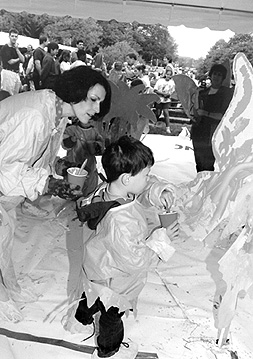
A It's a Spring Fling, and it consists of not only an open house but also activities on Lawyers Mall.
In Government House, we'll have a traditional open house from 1-4pm, with a theme for each of the public rooms where each of the Federated Garden Clubs of Maryland Inc. creates beautiful floral arrangements. We also have a wonderful exhibit of botanical paintings from the Walters Gallery in Baltimore. In the Conservatory, we have Imperial porcelain eggs from the Fabergé Collection from the Russian Embassy. In the yard are five pieces of sculpture from Salisbury State University that will be here until December.
Out on Lawyers Mall will be all these performances and arts activities, making everything from clay jewelry boxes to funny hats. What we really want to do is encourage everybody to be together, urge people to come and bring their mothers and grandmothers and great-grandmothers and mothers-to-be.
I'll be giving out "The Women's Good Health Journal" donated by St. Joseph Medical Center, a little booklet telling you all the things you should be doing and a little flower as well for mothers.
For every family, there's also a book we're giving out called Art of the State: Maryland, a hard-cover book by Harry N. Abrams Inc. Publishing so citizens can see what's going on from the Chesapeake Bay to great literary figures to philosophers who've lived here.
In the State House, there'll be the Older Americans exhibit, as well.
Q Is Government House also your home?
A We're here more than half the time, but actually what we do is rotate [between Government House and our home in University Park], which is the pragmatic thing. We're fortunate, and that's another way to cut off a lot of time.
Q What are you doing for Mother's Day?
A The day before Mother's Day is our big spring event here, and we have a lot of family coming in for that. Several of us are going to spell the night here so we can all get up together on Mother's Day.
My son's exams are over early. So he'll be home for Mother's Day. That's my very best Mother's Day present.
| Back to Archives |
VolumeVI Number 18
May 7-13, 1998
New Bay Times
| Homepage |